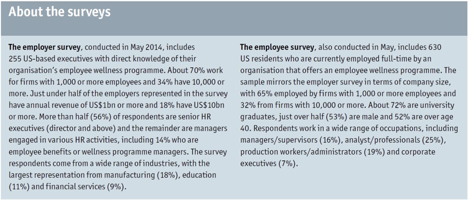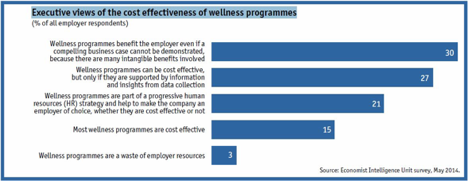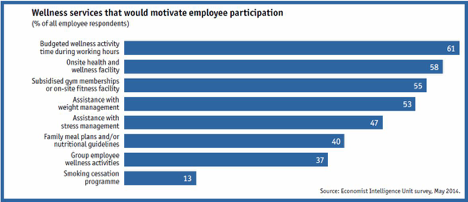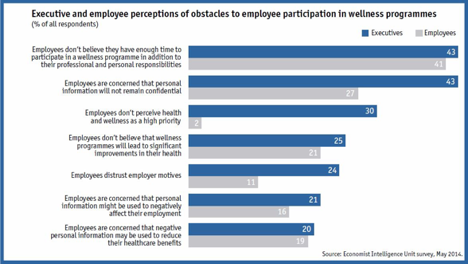Written by Christopher H Skinner.
In 2014, The Economist Intelligence Unit conducted a survey in partnership with Humana to measure employee wellness as well as employer wellness program availability. 255 individuals in executive positions in US-based companies were polled as well as 630 US residents with full-time jobs by an organization that offers wellness programs.

Based on the results of this survey, most executives agree that wellness programs are beneficial for the employer, with a majority of executives believing so even without compelling evidence. The second-largest group of executives believes that wellness programs can be beneficial when supported by accurate data collection. The third-largest group of executives believes that wellness programs are necessary, whether or not they are cost-effective. Only a very small percentage of executives believe that wellness programs are a waste of time and money.

A significant portion of employees are reluctant to participate in employer wellness programs for a number of reasons. The most numerous reason being that employees do not have enough time to participate in wellness programs while the next numerous reason being that employees don’t believe that their information will remain confidential. A sizable portion of employees also believes that their information will be used to negatively affect their employment and healthcare benefits. However, many employees responded that they would be more willing to participate in wellness programs if they had clear communication with their employers as well as a credible guarantee that their wellness information would not negatively affect them or be compromised.
In Summary,
? Many employers feel that wellness programs are cost-effective, even if unproven. They also believe that an objective cost-benefit analysis is not necessary or possible. They want better data collection and interpretation to make wellness programs more effective
? A significant portion of employees are reluctant to disclose wellness information unless the programs are communicated better by executives as well as a greater incentive to increase participation and a commitment to information security.
? Companies are moving forward and further developing mobile fitness trackers to collect wellness data.
? Very few employers want to cancel wellness programs altogether.
? The ultimate goal is to improve the employee overall wellness to have happier, healthier, more productive workers at a reasonable price.
? Most people do not know how to empirically quantify or measure wellness.
? No measure of psychological or mental health wellness was measured.



The future of better, more humane organizations will require more technology inclusion into existing HR frameworks. Historically, data gathering is poor, invasive or biased. New technologies will change how we see funding programs that truly work.
